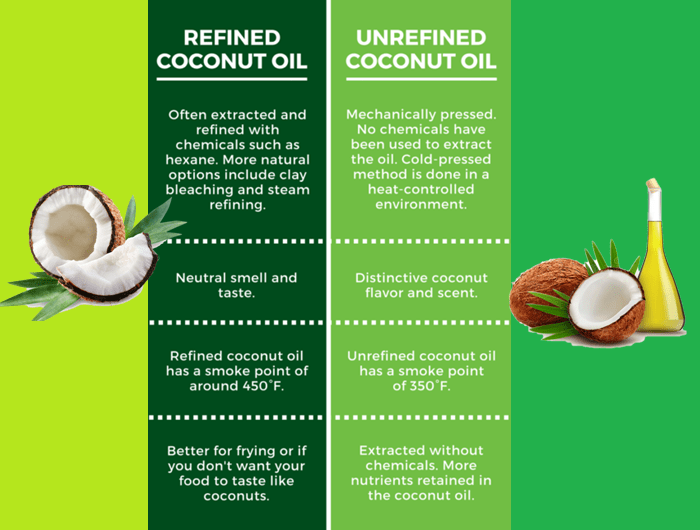Coconut oil is often sold with tags like refined, unrefined, virgin, extra virgin, organic, or cold-pressed. Indeed, it isn’t very clear. A comparison of unrefined vs. refined coconut oil is worth knowing.
Unrefined oils are usually labeled as raw, pure, or virgin. They are processed with minimal to no heat. They are often referred to as expeller-pressed or cold-pressed oils.
On the other hand, refined oil is bleached or deodorized to extract the maximum amount of oil. Its manufacturing process may involve heating and chemical treatments.
A survey found that 72% of Americans rated coconut oil as “healthy,” though only 37% of nutrition experts agreed. Coconut oil is popular in several trending diets, including ketogenic and Paleo. (Source: Harvard T.H. Chan)
Let’s examine the different types of coconut oil in detail here.
What Is Refined Coconut Oil
Refined coconut oil is extracted from copra (dried coconut meat). Matured coconut kernels are dried and baked in a sundry or copra dryer before extracting the oil from the presser. A rotary mill or expeller is mostly used to extract oil from copra.
The manufacturer may bleach the oil to kill off microbes and remove dust particles in the oil. Generally, it gives a longer shelf life to commercially sold oil.
Refined coconut oil may be hydrogenated to increase the shelf-life further.
Hydrogenation is when a liquid unsaturated fat is turned into a solid fat by adding hydrogen.
In hydrogenation, unsaturated fat (good fat) is turned into trans fat (bad fat).
A chemical solvent like hexane may sometimes extract the most oil from the copra. This process makes oil odorless and flavorless.
Refined coconut oil is best for baking or stir-frying, as this oil has a high smoke point.
What Is Unrefined Coconut Oil
Unrefined coconut oil is also labeled as ‘virgin’, ‘pure,’ or ‘extra virgin.’
Virgin coconut oil is extracted from fresh coconut milk, meat, or residue; spun down in a centrifuge. This process is called ‘wet milling’.
The wet-milling process yields both milk and oil together. Both are separated through fermentation, enzymes, or centrifuge machines.
Another method of extracting unrefined coconut oil is ‘dry-milling’. Grated or thinly sliced fresh coconut meat is dried with minimal heat. Then oil and milk are extracted from the partially dried (moisture content of 10–12%) coconut using a manual press or screw press.
Related post: Best Coconut Oil Substitutes
9 Differences: Refined vs. Unrefined Coconut Oil
Let us examine the similarities and differences between refined and unrefined coconut oil.
1. Source
- Unrefined: made from fresh coconut meat
- Refined: made from dry coconut meat (copra)
2. Aroma
- Unrefined: natural coconut scent
- Refined: neutral scent
3. Taste
- Unrefined: has a rich taste of natural coconut flavor.
- Refined: neutral taste with minimal or no flavor of coconut
4. Color
- Unrefined: neutral color
- Refined: golden or yellowish color resulting from heating
5. Smoke Point
- Unrefined: smoke point up to 350◦F
- Refined: smoke point up to 400◦F
6. Fat Content
- Both contain 63% MCT and 50% lauric acid.
- Refined oil may contain more trans fat than saturated fat.
7. Nutrition
- Unrefined: contains all the nutrition found in fresh coconut
- Refined: Baking and bleaching reduce the number of polyphenols and medium-chain fatty acids available.
8. Chemicals
- Unrefined: contains no added chemicals
- Refined: may contain added chemicals like hexane.
9. Uses
- Unrefined: best for medium-heat cooking, baking, and body and hair care; suitable for delicacies with coconut flavor.
- Refined: higher smoke point; best for stir-frying, baking, and body and hair care.

Taste and Color Differences
One of the chief differences between virgin and refined coconut oil is its taste.
Unrefined or virgin coconut oil has a tropical scent, flavor, and a deliciously nutty taste.
However, refined coconut oil has hardly any coconut taste or scent. Refined oil loses its taste because of heating and over-processing with added chemicals.
Unrefined coconut oil looks just like a thick, water-like liquid. But refined coconut oil looks yellowish or golden because of heating while processing.
Both have a white color when frozen.
Uses of Unrefined and Refined Coconut Oil
Both oil varieties suit cooking, baking, hair, and body care.
Refined coconut oil has a 400 °F smoke point suitable for stir-frying and baking.
Use unrefined coconut oil for medium-heat cooking below 350 °F.
The neutral flavor of refined oil is ideal for making recipes where coconut oil flavor shouldn’t appear.
Those who enjoy and relish the nutty taste of coconut must go for virgin coconut oil.
Regarding nutrition and health benefits, unrefined coconut oil is superior to refined ones.
Related post: Coconut Oil For Weight Loss
Criteria For Choosing Good Coconut Oil
As far as possible, use the best quality coconut oil, especially for body and hair care.
If you are buying coconut oil from a store, look for the following qualities:
- It’s certified organic and verified non-GMO.
- Choose cold-pressed coconut oil.
- It should not contain hexane.
- Not bleached or deodorized.
- Doesn’t contain sulfites or other bleaching agents.
- Pure and organic liquid coconut oil is colorless and transparent.
Should You Use Refined Or Unrefined Oil
You can confidently choose any of them according to your preferences.
Both refined and unrefined oils have the same nutritional profile.
Nonetheless, a few unverified studies claim that refined oil contains more trans fat, which is bad for heart health.
According to the Harvard T.H. Chan School of Public Health, use coconut sparingly in baking and cooking.
At the same time, you will find several studies recommending the use of coconut oil because of the high MCT content in it.
If you relish the taste of coconut, then unrefined oil is best for you. Plus, it retains the original nutrients present in coconut kernels.
Those who dislike coconut oil’s taste and aroma should choose refined oil.
Warning: Excess consumption of any oil is bad for your health. Only consume up to two tablespoons of coconut oil per day.
Read next:
